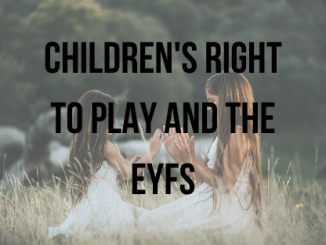Sometimes, parents look to Early Years Practitioners as ‘experts’ and seek their guidance and advice, and whilst Early Years practitioners may be experts in early education and child development, they still have plenty to learn from parents!
Parents knowledge of their own children is unrivalled; they are usually experts on their child’s likes, dislikes, and unique personalities. Parents have unparalleled influence on their children’s lives and are ‘children’s first and most enduring educators'(Curriculum Guidance for the Foundation Stage, QCA 2000) Children spend 70% of their time at home or in the community, as opposed to in Early Years settings and this significant portion of time is indicative of significant opportunities for learning and development. Improving communication between the Early Years setting and the parents is beneficial to learning both within and out of the setting.
A joined up, holistic approach to learning with open channels of communication has many benefits to the child, parent and practitioner. The practitioner can benefit from the wealth of knowledge that the parent has about their own individual child and use that knowledge to plan for and develop the individual child’s learning. The child then benefits by having their specific needs met in a way that is consistent with their home life which allows for a smoother transition and a sense of security in the setting. In turn, parents are made to feel at ease with leaving their child at the setting, and also feel they can ask practitioners for help or advice if needed. It’s a positive for all 3 parties, a win-win-win situation.
The initial meeting
An initial meeting before the child joins the school is an ideal time to set the tone for this open-communication relationship; it’s important that practitioners help parents to feel at ease and encourage them to share information as freely as possible.
As well as the initial meeting being a great time to gather practical information such as how the baby is fed, what foods the toddler likes, how and when the child naps, it is also important to take the opportunity to share higher-quality information. Sharing information about the child’s interests, temperament and learning style will pay dividends in terms of planning for that child. Most parents will not talk to practitioners about their child having a kinaesthetic learning style, or an enveloping schema but will enjoy talking about their child and make many observations about them, the information they can provide is invaluable! Practitioners can listen out for parents describing how their child is ‘constantly on the go’ ‘loves to run and jump’ or ‘is really hands-on’ to find out the information they are looking for.
Daily catch-ups
Once the child is settled into the Early Years setting it is helpful for the parent to share information daily about how the child has slept, how they have been that morning and any other points of concern. This will give the practitioner an idea of how ready the child is to learn that day and any comfort measures they made need to take. Practitioners should ask questions such as “what did you do at home yesterday?” or “did you do anything special at the weekend?” to give parents an opportunity to give some more in-depth information about what their child has been learning.
At the end of the Nursery day, practitioners should try to give the parent time to greet their child and connect with them before going over any housekeeping points. If possible, they should use a daily diary or online system to record basic information about milk or food, sleep, nappy changes and so on. This frees them up to relay information about what the child has enjoyed and been learning that day. This is the stuff that parents really care about and helps them to know that their child is happy, safe and developing within the setting.
Encouraging partnership
There are a number of ways to encourage a deeper partnership between the setting and parents;
The child’s Learning Journey is an important document that should communicate to parents what their child has been doing, and learning, in the setting and record practitioners’ observations and assessments. This may be traditional paper scrapbooks or files, or in a digital format. Best practice is to have the parents feed information and observations into the learning journey too, or to reference that this has been done verbally for example “Ben’s mum told me that they had visited the safari park at the weekend and that Ben had taken great interest in the lions, I set up the sand tray as a safari park with grass and small-world lions and a jeep…”
Display boards can be used within the setting to demonstrate the types of learning the children have been engaged in and to keep parents up to date on upcoming special events. Using special events as an opportunity to build better links with home is another good strategy; for example, you might host a breakfast club once a month, have a special Christmas party or concert for parents to come to, or have a regular ‘stay and play’ session on offer. All of these are chances for parents and carers to come in and get to know the setting better and build up stronger links and therefore, better communication.
Some settings have great success with parent forums or Parent-Teacher Associations; these give parents ownership over choices within the setting and help them feel invested in the setting.
Another way to improve the partnership between home and the Early Years setting is to create activities that can be taken home. Homework is generally not suitable in Early Years but a set of bags with activities e.g. story sacks, nursery rhyme bags, or number games that the children can choose to take home to complete with their parents or carers, is a good way to involve parents in their children’s learning. A bear or cuddly toy that gets taken home by a different child each weekend and comes back with a report of their time with that family is also a good way for parents to let practitioners know more about their family and for practitioners to glean valuable information that can further a child’s learning.
Partnering with parents is vital for Early Years practitioners to be able to support children holistically and help them to develop.








